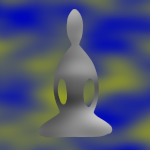Dear Friends,
In a short story called “A Painful Case,” James Joyce wrote that the main character, Mr. Duffy, “lived at a little distance from his body.”
As we sit with our devices at hand, reading these words, perhaps some may notice that we too live at a little distance from our bodies. I have certainly noticed that in myself.
The good news is that embodiment is trainable. Mindfulness is one way we can develop a more embodied awareness.
Venerable Analayo, a Buddhist monk and scholar, talks about proprioceptive awareness, a natural ability to sense the body’s position and its movements.
Jeanne has done a fun little exercise to remind ourselves of this. If you want to give it a try, then after you read these instructions, start by closing your eyes. Extend one arm and move it around. We have a sense, even with the eyes closed, of where the arm is relative to the body. With the eyes still closed, does the hand know where to move to touch the top of your head or an ear? That’s an aspect of proprioceptive awareness.
Analayo describes this further:
Meditative cultivation of this felt sense of physical presence can take place by being aware of the body in any posture. This requires allowing this natural ability of proprioceptive awareness to become a recognized aspect of our experience. … Such meditative cultivation is not a forceful grabbing hold of the body, but rather a resting in the presence of the whole body. The phrase I tend to use to introduce the flavour of this practice is: “We are aware of the body in the sitting posture and we let the mind rest on the body just as the body rests on the cushion.”
Properly cultivated, such mindfulness of the body results in a sense of being firmly grounded in the body; it is an embodied awareness. Such embodied awareness does not need to interfere with other tasks and activities. Instead, it can accompany them. To accomplish this takes training. The natural tendency of the mind is either to focus or to ignore. Proprioceptive awareness can be employed to cultivate a middle path between these two extremes.
Analayo, Satipaṭṭhāna Meditation: A Practice Guide, Windhorse Publications, Cambridge, 2018, page 13
This is a skill we can build in everyday life too. So here’s a practice to try:
Pick a short, ordinary activity to do mindfully everyday this week. Some ideas are brushing your teeth, washing the dishes, showering, making tea. (Don’t be too ambitious! A huge sink of greasy dishes might be a tall order! Maybe one plate is doable.) Pay attention to your experience when doing this task. How does your body feel? What are you thinking? What do you see, hear, sense? Like in meditation, when you notice that your mind has wandered, acknowledge that and return to the experience of the activity.
As an example, I try to do this while washing dishes. I can notice the warmth of the water, the slipperiness of the plate in the soapy water, the way one hand will hold the plate while the other moves the dishrag, the sound of the water tinkling as I rinse. And I notice that I’m thinking about a technical issue I need to resolve at work, and that I should phone my parents, and that I did not pay attention to the experience of washing the cutlery! And begin again…
I also notice a sweet sense of connection to my grandmother. Her pans and dishes were always like new. And I realize now that she probably was fully present with her dish washing – attending to the finest detail. My pots seem to gleam a bit brighter now too, since I’ve taken on this practice.
Mother, Washing Dishes
She rarely made us do it—
we’d clear the table instead—so my sister and I teased
that some day we’d train our children right
and not end up like her, after every meal stuck
with red knuckles, a bleached rag to wipe and wring.
The one chore she spared us: gummy plates
in water greasy and swirling with sloughed peas,
globs of egg and gravy.Or did she guard her place
Susan Meyers
at the window? Not wanting to give up the gloss
of the magnolia, the school traffic humming.
Sunset, finches at the feeder. First sightings
of the mail truck at the curb, just after noon,
delivering a note, a card, the least bit of news.
https://www.poetryfoundation.org/poems/53575/mother-washing-dishes
Do you have a task you plan to do mindfully? It can help to share! Tell a friend, put up a sticky notes. You can also leave a comment on this post or send me an email too. I look forward to hearing about your activity.
With best wishes,
Andrea

Ah, yes, doing the dishes.
When you do the dishes, do the dishes.
A window of the kitchen sink helps one see more than what meets the eye.
“A window of the kitchen sink helps one see more than what meets the eye.” I love this!!
Thanks for sharing.
Thank you Andrea for the lovely peaceful guided meditation focusing on the breath yesterday morning. An excellent backstop to the practice you are suggesting for us today.
So appreciative of your time, effort and clarity . . . much gratitude
I am loving the poetry you’ve been sharing within your daily messages. Thank you so much for enabling us to learn via different forms of writing.
Thanks Linsday. I really didn’t appreciate poetry until I started my meditation practice.
Over the past few months, making tea before bed has become something of an evening ritual in our household. Some times I find myself getting down the tea bags only to realize that the tea is already steeping! So… making tea will be my mindful and embodied activity this week.
Wonderful! I usually make tea before bed too… I’ll remember you’re mindfully doing that too!